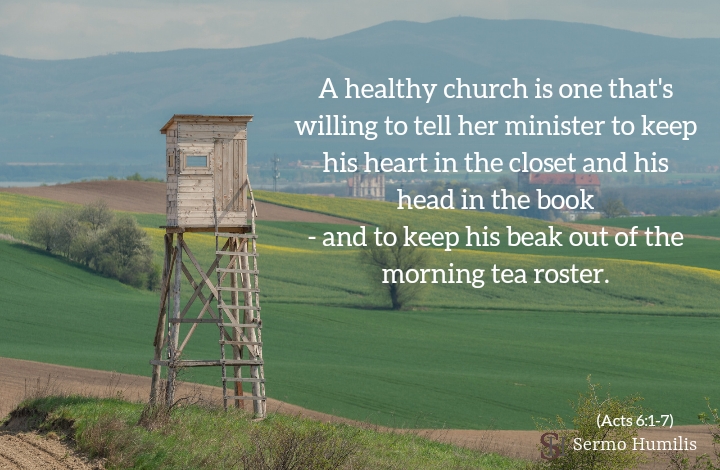
Was it 300 years of persecution that threatened the very life and existence of the early church? Was it Caligula? Was it the rise of the Antichrist or the NIV Bible, or Amy Grant, or the advent of Christian puppet shows?
No. It was a small group of worthy widows in Acts chapter 6.
Now in these days when the disciples were increasing in number, a complaint by the Hellenists arose against the Hebrews because their widows were being neglected in the daily distribution. (Acts 6:1)
In the 1200 years since God had established His Covenant with the people of Israel at Mount Sinai, the care of widows and orphans had been central to the godly life and ministry of the Hebrew people.
Learn the good… correct oppression; bring justice to the fatherless and plead the widow’s cause. (Isaiah 1:17)
Is this not the fast that I have chosen… to share your bread with the hungry and bring the homeless poor into your house… (Isaiah 58:6-7)
With Christ enthroned and the Spirit of God poured out, the early church flourished. In great numbers, people were turning from sin and death and finding salvation and eternal life through faith in the death and resurrection of Jesus.
Many of those early converts were Hellenistic Jews. These Hellenistic Jews were out-of-towners. Strangers. Blow-ins. Greek-speaking Israelites who would come from far and wide to celebrate with the Jews of Israel each year. A roof over their head and food on the plate would have been a top priority for any godly Jewish community.
But they also represented a peculiar kind of threat.
And the twelve summoned the full number of the disciples and said, “It is not right that we should give up preaching the word of God to serve tables”. (Acts 6:2)
The Apostles, it seems, knew how to set a table. Then knew on what side of the plate to put the fork. They knew what lane they had been given to drive in, and they knew the seriousness of their task. To take on another task, no matter how noble, would have meant side-lining the very thing Jesus had commanded them to do.
The solution was not a case of either/or, but of both – in their proper place.
Therefore, brothers, pick out from among you seven men of good repute, full of the Spirit and of wisdom, whom we will appoint to this duty. But we will devote ourselves to prayer and to the ministry of the word.” (Acts 6:3-4)
The greatest threat to the church came not when Queen Mary took to Protestants with a box of matches, not while Nero fiddled, but when the ministers of the gospel could have set aside word and prayer for the sake of something else. For the sake of one of the most genuinely needy and under-served communities in the world. For the sake of charity.
The Apostles did not underestimate the problem. They knew the importance of this charity, and so they appointed the most godly, Spirit-filled men of wisdom they could find for the task. Men above reproach. Men like Stephen, who would later give his life for the gospel.
Thus was born the church deacon. Those Spirit-filled and mature men and women whose high and humble calling is to serve the daily needs of God’s people so that those who are called to the ministry of word and prayer can also serve without distraction.
And why do I bring this up? Because it’s so easy for those currently called to serve as ministers of the word to get distracted. And it’s such a neat trick played by the devil to distract them with noble (and sometimes not-so-noble) causes.
Food banks, building projects, the lamington stall, church finances, the annual ecumenical barn dance, shopping for candles and carpet squares, youth volleyball games, seating arrangements, the sound desk, the key of E, and secondary incomes.
But wisdom is justified by her children.
And the word of God continued to increase, and the number of the disciples multiplied greatly in Jerusalem, and a great many of the priests became obedient to the faith. (Acts 6:7)
Prayer and the study of God’s Word in order to preach effectively to a dying world (Romans 10:14-15). This is the singular calling of the Pastor.
These two things—a life submersed in prayer and the word of God—do not exclude good works. Nor do they deny the power of God to preach Christ to the lost through your charity, your conduct, and even your silence (1 Peter 3:1-2).
But for the pastor and shepherd of God’s people, these things should always be demonstrably subservient to a life shaped by prayer and the proclamation of God’s Word.
And a healthy church is a church that is ready and willing to tell her minister to get his heart back in the closet and his head back in the book—and to keep his beak out of the morning tea roster.

 What do You Want to Read About?
What do You Want to Read About?
Robert Champness says
Dear David, I found your article thrilling and a joy to read; so cleaverly written with wit and purpose. But, unfortunately, impractical in these days. If we were experiencing the great volumes of converts the early Church was experiencing in the days of Pentecost, I would have no hestitation in agreeing with you. Unfortunately to-day, if a Minister sees more than one or two conversions in a year, they are doinging extremely well. In most Churches, growth seems to come about by rotation rather than conversions, but, at the time of Pentecost referred to in Acts 6, conversions were by hundreds; daily. And besides, Ministers to-day are employees. They are employed by a Church to Minister to the needs of that Church. Not like the days referred to in Acts 6. To-day, if a congregation does not like what the Minister is doing, or if he is not doing what he is paid by them to do, they can sack him, Not so in Acts 6. Wonderful message though. I loved it. Thank you for it.
David Trounce says
Thanks Robert.